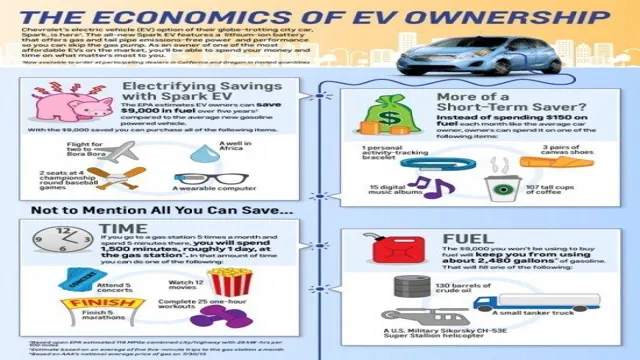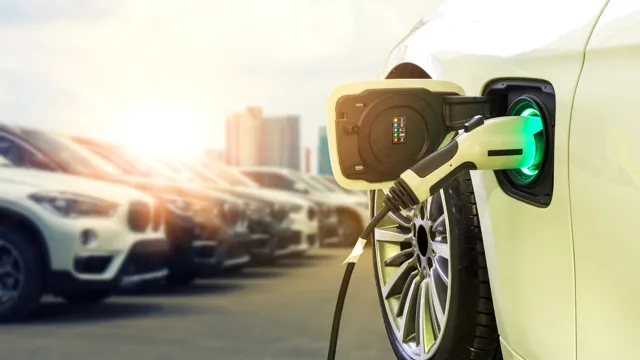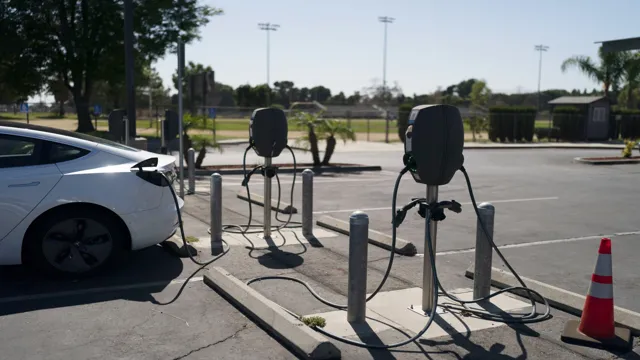Uncovering the Financial Perks of Embracing Electric Cars: How Going Green Can Save You Money
Electric cars have been around for a while, but in recent years they have become increasingly popular as an alternative form of transportation. Not only are they environmentally friendly, but they also come with a range of economic benefits that appeal to many drivers. From lower operating costs to tax incentives, the advantages of electric cars go beyond just their eco-friendliness.
So how exactly do these vehicles benefit our pockets? In this blog post, we’ll explore some of the top economic benefits of electric cars and why they may be worth considering for your next vehicle purchase.
Lower Operating Costs
Electric cars offer a range of economic benefits over their traditional gasoline-powered counterparts, the most significant of which likely comes from their lower operating costs. Though the initial investment in an electric car can sometimes be higher than for a gas-powered car, the total cost of owning an electric car over time can be significantly lower. Because electric cars rely on electricity rather than gasoline to run, their fuel costs are significantly lower, and drivers may also save money on maintenance and repair thanks to their simpler design.
Furthermore, because electric cars produce fewer emissions than gas-powered cars, drivers may also be able to save money on taxes, insurance, and other expenses related to vehicle ownership. Overall, while electric cars are not necessarily the best choice for every driver, those looking to save money in the long term may find that they offer significant economic benefits.
Electricity is Cheaper Than Gasoline
Electricity is indeed cheaper than gasoline when it comes to operating costs. With an EV, drivers can save money on fuel costs in the long run as charging the vehicle with electricity costs lesser than filling up the tank with gasoline. In some areas, the price difference can be substantial.
Additionally, electric vehicles do not require frequent maintenance, compared to traditional vehicles with internal combustion engines. The lack of oil changes, transmission fluid replacements, and other related services can bring in significant savings for EV owners. While the upfront cost of an EV may be higher than a traditional vehicle, the lower operating costs make up for the difference in the long run.
Overall, switching to an EV can save both money and the environment.
Fewer Maintenance Costs for Electric Cars
When it comes to owning a car, one of the major concerns for consumers is the cost of maintenance. With electric cars, owners can rest assured that maintenance costs will be significantly lower than their gas-guzzling counterparts. This is because electric cars have fewer moving parts resulting in lower wear and tear.
For instance, electric cars don’t have a traditional combustion engine, which means they don’t have oil to change, spark plugs to replace, or emissions checks. Taking care of an electric vehicle generally involves replacing the brakes and tires, which can last longer due to regenerative braking. Overall, electric cars are much simpler to maintain, reducing maintenance costs and time spent at the mechanic.
This makes electric cars an excellent option for consumers who want to save money and reduce their impact on the environment.
Lower Environmental Impact
Electric cars are not only beneficial for individual drivers but for the environment as a whole. These vehicles have lower environmental impact compared to traditional gasoline-powered cars. By using electric cars, we can reduce carbon emissions in the atmosphere, helping to tackle climate change.
The economic benefits of electric cars extend beyond individual savings on fuel and maintenance costs. Governments and businesses can take advantage of the potential cost savings and environmental benefits as well. For example, companies can reduce their carbon footprint by using electric vehicles for their deliveries, while governments can introduce incentives such as tax credits for individuals who choose to switch to electric cars.
The shift towards electric vehicles will not only promote sustainable living but has the potential to decrease our dependence on fossil fuels and reduce pollution.
Reduced Emissions of CO2 and Other Pollutants
Reduced emissions of CO2 and other pollutants can have a significant positive impact on our environment. Whether it’s reducing harmful greenhouse gases or air pollutants, every step taken towards cleaner energy sources and sustainable practices can make a difference. For example, by transitioning to electric vehicles or utilizing renewable energy sources like wind and solar power, we can decrease our reliance on fossil fuels and lower our carbon footprints.
These actions not only benefit the planet, but also lead to healthier living conditions for humans and wildlife alike. Just like how a small pebble creates ripples in a pond, our efforts towards reducing emissions can create a cascade effect towards a cleaner, better world. So, let’s all do our part in reducing our environmental impact and work towards a greener future.
Cost Savings Due to Reduced Health Impacts
Reduced environmental impact can have major benefits for human health and finances. The cost savings due to reduced health impacts can be significant, especially for those living in polluted areas or with pre-existing health conditions. By reducing the amount of pollution and toxins released into the environment, there are fewer negative health impacts such as respiratory issues and pollution-related illnesses.
This can lead to reduced healthcare costs for individuals, as well as savings for healthcare systems and insurance companies. Additionally, reducing environmental impact can result in increased productivity and reduced absenteeism at work, leading to financial benefits for employers and employees alike. By making conscious choices in our daily lives to reduce our environmental impact, we can not only benefit the planet but also improve our own health and financial wellbeing.
Avoidance of Carbon Taxes and Fines
As the world becomes increasingly aware of the impact of human activities on the environment, individuals and businesses are seeking ways to reduce their carbon footprint. One effective way to achieve this is by avoiding carbon taxes and fines. Governments around the world are implementing carbon taxes to discourage businesses from emitting excessive amounts of carbon dioxide into the atmosphere.
These taxes can be quite expensive, leading some businesses to seek ways to minimize their carbon emissions and ultimately avoid paying such fees. By taking proactive measures to lower their environmental impact, businesses can also improve their reputation and attract environmentally conscious customers. Ultimately, choosing to protect our planet by reducing carbon emissions is a smart and ethical strategy for everyone involved.
Government Incentives and Rebates
If you’re considering buying an electric car, you’ll be happy to know that there are many government incentives and rebates available that can help offset the initial cost. These incentives can vary depending on where you live, but many states and municipalities offer tax credits, grants, or rebates for purchasing an electric car. Additionally, these incentives often extend to charging infrastructure, too, making it easier and more affordable to charge your vehicle at home or on the go.
Some states even offer HOV lane access or reduced tolls for electric vehicle drivers. Not only do these incentives provide an economic benefit to consumers, but they also help promote the growth of the electric vehicle market and reduce environmental impact. So, while buying an electric car may seem like a larger investment upfront, these incentives make it an increasingly attractive option for those looking to save money and do their part for the planet.
Tax Credits and Rebates for Purchasing Electric Cars
If you’re considering purchasing an electric car, it’s essential to know about the government incentives and rebates available to you. Many countries offer tax credits and rebates for those who purchase electric vehicles. For example, in the United States, you may be eligible for a federal tax credit of up to $7,500, depending on the type and model of car you purchase.
Some state governments also offer additional incentives, such as rebates, tax deductions, or free charging stations. These incentives not only help to offset the higher initial cost of electric cars but also encourage individuals to invest in environmentally-friendly transportation. Be sure to research the incentives available in your area before making a purchase, to help you make an informed decision.
Access to HOV Lanes and Free Parking
One of the main incentives provided by the government for purchasing an electric vehicle (EV) is the access to HOV lanes and free parking. This is an exciting opportunity for EV owners who can take advantage of these perks, which can save time and money. HOV lanes are designated for high-occupancy vehicles and allow drivers to avoid traffic congestion during peak hours.
However, with an EV, drivers can also use these lanes even if they’re driving alone, which can significantly reduce travel time. Additionally, electric vehicle owners can often park for free or at reduced rates in public parking lots, which can again save money in the long run. These incentives are just some of the ways that the government is encouraging people to make the switch to electric vehicles and help reduce carbon emissions.
So, if you’re considering purchasing an electric vehicle, keep in mind the benefits that come with it, including access to HOV lanes and free parking.
Long-Term Savings for Businesses and Fleets
Electric cars are gaining popularity not only due to their environmental friendliness but also due to the economic benefits they provide to businesses and fleets. While electric vehicles may have a higher upfront cost, they ultimately have lower operational and maintenance costs over their lifespan compared to traditional gasoline-powered vehicles. This is due to electric cars having fewer moving parts and requiring less frequent maintenance.
In addition, electric cars have lower fuel costs as electricity is cheaper than gasoline. Companies that switch to electric vehicles can save significantly on fuel and maintenance costs, making it a smart long-term investment. Furthermore, electric fleets can benefit from incentives such as government grants, tax credits, and lower insurance rates.
In the long run, the economic benefits of electric cars make them a wise choice for businesses and fleets looking to save money and reduce their carbon footprint.
Conclusion
In conclusion, it’s clear that electric cars have the potential to revolutionize our economy in a number of ways. Not only do they offer significant savings on fuel and maintenance costs, but they also create new job opportunities and contribute to the growth of a sustainable energy industry. Plus, with electric cars, you’ll never have to worry about the rising cost of gas or the damaging effects of emissions on the environment.
So next time you’re considering purchasing a new car, consider going electric for all the economic benefits it has to offer. Your wallet, and the planet, will thank you.”
FAQs
What are some of the economic benefits of using electric cars?
Electric cars offer lower operating costs, reduced maintenance expenses, and potential tax incentives or rebates.
Do electric cars have a higher upfront cost compared to traditional gasoline vehicles?
Yes, electric cars typically have a higher upfront cost due to the expense of battery technology. However, the long-term savings in fuel and maintenance costs often outweigh this initial expense.
How does the cost of electricity compare to gasoline in terms of mileage?
On average, electric cars can travel further per dollar spent on electricity compared to gasoline. The exact cost savings vary based on the specific rates and charges in each region.
Are there any environmental benefits to using electric cars beyond economics?
Yes, electric cars produce no emissions during operation, reducing air pollution and contributing to a cleaner environment. Additionally, many electric cars use recycled or sustainable materials in their construction.


